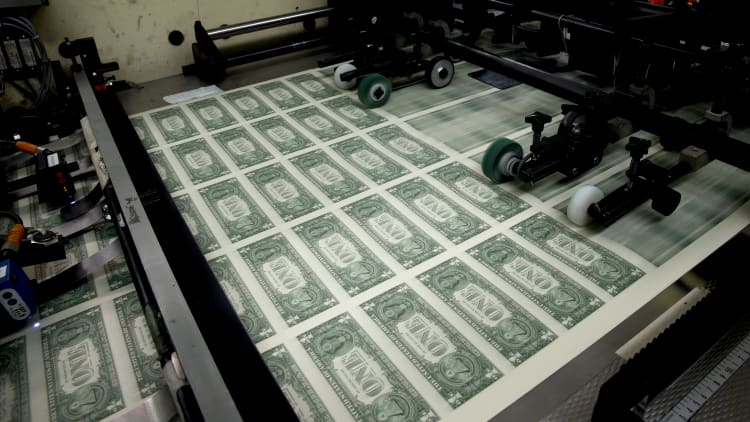Central banks and governments have funneled record amounts of money into their economies to fight the global recession triggered by the coronavirus pandemic.
The Federal Reserve's balance sheet has ballooned from $4 trillion in mid-March to roughly $7 trillion. Congress has passed trillions of dollars in stimulus funding, with more likely on the way.
The infusion of cash into the financial system has renewed concerns that inflation could surge.
"People who espouse that view of, as Milton Friedman said, inflation is always and everywhere a monetary phenomenon, if you believe that you look at the central bank balance sheets exploding right now and you say there's going to be inflation," Citi global chief economist Catherine Mann told CNBC.
Supply shocks have driven up prices for some goods in recent months. Yet many economists expect consumer prices will stay low despite trillions of dollars in government stimulus.
"While there certainly is quite a lot of disruption to the supply side of the economy, that's likely to be dominated by the huge hit to aggregate demand," said Evercore ISI Vice Chairman Krishna Guha.
Weak demand
So far, weak demand has muted prices across advanced economies. U.S. consumer prices dropped for three consecutive months before rebounding in June.
The latest projections from Federal Reserve policymakers show inflation will stay below the central bank's 2% target over the next two years.
"At this stage, even with the Fed doing as much as it can, it's still not leading to an enormous increase in demand," Olivier Blanchard, a senior fellow at the Peterson Institute for International Economics, told CNBC.
He added the $1,200 stimulus checks from the federal government were not big enough to stoke inflation.
"The checks, while they helped, they didn't lead to a boom in demand," Blanchard said.
Balance sheet expansion
Economists say another reason inflation might stay low is that the link between money creation and consumer prices has weakened in recent years. When the Fed bought trillions of dollars in assets after the 2008 financial crisis, inflation never surged.
Banks have kept much of the cash created by the Fed's recent purchases "on account" in the form of excess reserves, instead of lending it out into the economy.
"The experience of the last decade is that central bank balance-sheet expansion certainly need not generate a period of excess inflation, and, in fact, even with a big balance sheet, it might still be hard to get the inflation that you want," Guha said.
While recent stimulus measures might not directly boost prices for consumers, some say it is causing inflation in other places like the stock market or housing market.
"I think we're looking at very significant increases in asset price inflation," Citi's Mann said.




